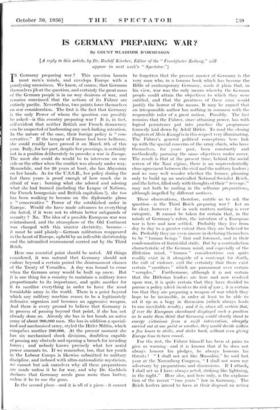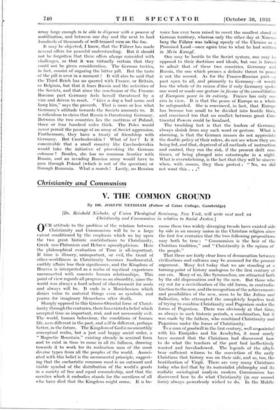IS GERMANY PREPARING WAR ?
By COUNT WLADIMIR D'ORMESSON
PI reply to this article, by Dr. Rudolf Kircher, Editor of the " Frankfurter Zeitung," will . appear in next week's " Spectator."] IS Germany preparing war ? This question haunts most men's minds, and envelops Europe with a paralysing uneasiness. We know, of course, that Germans themselves jib at the question, and certainly the great mass of the German people is in no way desirous of war, and remains convinced that the actions of its Fiihrer are entirely pacific. Nevertheless, two points force themselves on our consideration. The first is the fact that Germany is the only Power of whom the question can possibly be asked—is this country preparing war ? It is, in fact, self-evident that neither British nor French democracy can be suspected of harbouring any such lurking intention. In the nature of the case, their foreign policy is " con- servative." If the temper of France had been bellicose, she could readily have proved it on March 8th of this year. Italy, for her part, despite her preenings, is certainly not in a position deliberately to provoke a war in Europe. The most she could do would be to intervene on one fide or the other when the conflict was already under way. Meanwhile, and for 20 years at least, she has Abyssinia on her hands. As for the 'U.S.S.R., her policy during the last three years is proof enough of how much she is afraid of war : burning what she adored and adoring what she had burned (including the League of Nations, the French bourgeoisie and British capitalism !), she too has been working to become on the diplomatic plane a " conservative " Power of the established order in Europe. Would she have made advances to everything she hated, if it were not to obtain better safeguards of security ? No. The idea of a possible European war was reintroduced, and the atmosphere of the Old Continent was charged with this sinister electricity, because— it must be said plainly—German militarism reappeared in the heart of Europe, upheld by an inflexible dictatorship and the intensified rearmament carried out by the Third Reich.
Here one essential point should be noted. All things considered, it was natural that Germany should not endure beyond a certain period the disarmament clauses of the Treaty of Versailles. A day was bound to come when the German army would be built up anew. But it is one thing for a country to maintain a military force proportionate to its importance, and quite another for it to sacrifice everything in order to have the most formidable army in the world. There is a point beyond which any military machine ceases to be a legitimately defensive organism and becomes an aggressive weapon. And there is every ground to believe that Germany is in process of passing beyond that point, if she has not already done so. Already she has in her hands an active army of about 900,000 men. She has in addition a special- ised and mechanised army, styled the Hitler Militia, which cOmprises another 200,000. At the present moment she has six mechanised shock divisions, doubtless capable of passing any obstacle "and opening a breach for invading forces ; and nobody knows precisely what her aerial power. amounts to. If we remember, too, that her youth in 'the Labour Camps is likewise submitted to military discipline, and-imbued with ultra-nationalistic mysticism, we cannot but ask ourselves why all these preparations are made unless it be for war, and why Dr. Goebbels declares that Germany needs guns more than butter, unless it beto use the guns.
In the second place—and it is all of a piece—it cannot be forgotten that the present master of Germany is the very man who, in a famous book which has become the Bible of contemporary Germany, made it plain that, in his view, war was the only means whereby the German people could attain the objectives to which they were entitled, and that the greatness of these aims would justify the horror of the means. It may be argued that an irresponsible author has nothing in common with the responsible ruler of a great nation. Possibly. The fact remains that the Fiihrer, since attaining power, has with logical persistence put into practice the programme formerly laid down by Adolf Hitler. To read the closing chapters of Mein Kampfis in this respect very illuminating. The Farces general political conceptions here link up with the special concerns of the army chiefs, who have themselves, for years past, been constantly and methodically pursuing the same objectives under cover. The result is that at the present time, behind the social screen of the Nazi regime, there is an unprecedentedly close agreement between the civil and the military leaders ; and we may well wonder whether the former, planning only to build up an unrivalled National-Socialist Reich, and the latter, filled only with thoughts of their " revenge," may not both be uniting in the selfsame preparations, although impelled by different motives.
These observations, therefore, entitle us to ask the question—is the Third Reich preparing war ? Let us be clear, however : for in such matters nothing is ever categoric. It cannot be taken for certain that, in the minds of Germany's rulers, the intention of a European war is here and now settled. Probably they live from day to day to a greater extent than they are believed to do. Probably they are even sincere in declaring themselves to be " human beings " first and foremost, and in their condemnation of fratricidal strife. But by a contradiction characteristic of the German mind, and especially of the Hitlerian mind, " human " considerations can quite readily exist in it alongside of a contempt for death, the cult of violence, and the certainty that there exist certain " sacrifices ' which are paramount over certain " scruples." Furthermore, although it is not certain that the Hitlerian leaders are here and now resolved upon war, it is quite certain that they have decided to pursue a policy which involves the risk of war ; it is certain too that they are preparing a weapon of war which they hope to be invincible, in order at least to be able to set it up as a bogy in discussion (which always leads to one inevitable result) ; and it is, above all, certain that, if ever the European chessboard displayed such a position as to make them think that Germany would clearly stand to emerge victorious from a swift intervention, abruptly carried out at one point or another, they would decide within a few hours to strike, and strike hard, without even giving Europe time to turn round.
For the rest, the Fiihrcr himself has been at pains to give us warning.—and it is known that if he does not always honour; his pledges, he always honours his threats ! " I shall not act like Mussolini," he said last year at the Nuremberg Congress, " I shall not warn my adversary by preparations and discussions. If I attack, I shall act as I have always acted, striking like lightning, in the night." Here also, and here only, is the explana- tion of the recent " two years " law in Germany. The Reich leaders intend to have at their disposal an activo army large enough to be able to dispense with a process of mobilisation, and between one day and the next to hurl hundreds of thousands of well-trained Into on the foe.
It may be objected, I know, that the Ffihrer has made several offers for peaceful understanding. But it should not be forgotten that these offers always coincided with challenges, so that it was virtually certain that they could not be given consideration. The German tactics, in fact, consist of sugaring the bitter pill. But the taste • of the pill is over in a moment ! It will also be said that the Third Reich has no quarrel with France, or Britain, or Belgium, but that it fears Russia and the activities of the Soviets, and that since the conclusion of the Franco- Russian pact Germany feels herself threatened by a vice and driven to react. " Give a dog a bad name and • hang him," says the proverb. That is more or less what Germany's attitude towards the Soviets amounts to. It is ridiculous to claim that Russia is threatening Germany. Between the two countries lies the mattress of Poland, three or four hundred miles thick. The Poles would never permit the passage of an army of Soviet aggression. Furthermore, they have a treaty of friendship with Germany. But CzechosloVakia ? What of her ? Is •it conceivable that a small country like Czechoslovakia would take the initiative of provoking the German colossus ? Besides, she has no common frontier with Russia, and an invading Russian army would have to pass through Poland (which is out of the question) or through Rumania. What a march ! Lastly, no Russian voice has ever been raised to covet the smallest shred of German territory, whereas only the other day at Nurem- berg the Fiihrer was talking openly of the Ukraine as a Promised Land—once again true to what he had written in Mein Kampf.
One may be hostile to the Soviet system, one may be opposed to their doctrines and ideals, but one is forced to admit that . of these two countries, Germany and Russia, the one which presses a definite threat to peace is not the second. As for the Franco-Russian pact—a pact open to all, and primarily to Germany—it would lose the whole of its raison d'etre if only Germany spoke one word or made one gesture in favour of the consolidation of European peace in its entirety. France has only one aim in view. It is that the peace of Europe as a whole be safeguarded. She is convinced, in fact, that Europe has become too small to be divided into hostile blocs, and convinced. too that no conflict between great Con- tinental Powers could be localised.
The troubling fact is that the leaders of Germany always shrink from any such word or gesture. What is alarming, is that the German masses do not appreciate the double policy of their rulers, do not see where they are being led, and that, deprived of all methods of instruction and control, they run the risk, if the present drift con- tinues, of being plunged into catastrophe in a night.. What is overwhelming, is the fact that they will be sincere when, with moans, they then protest : " No, we did not want this . t"-





















































 Previous page
Previous page